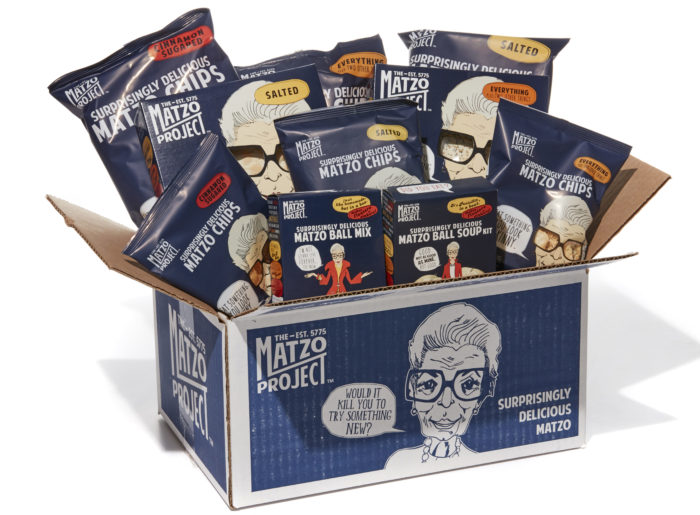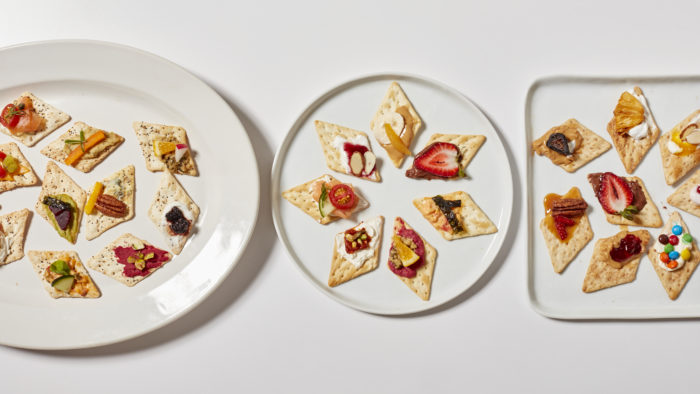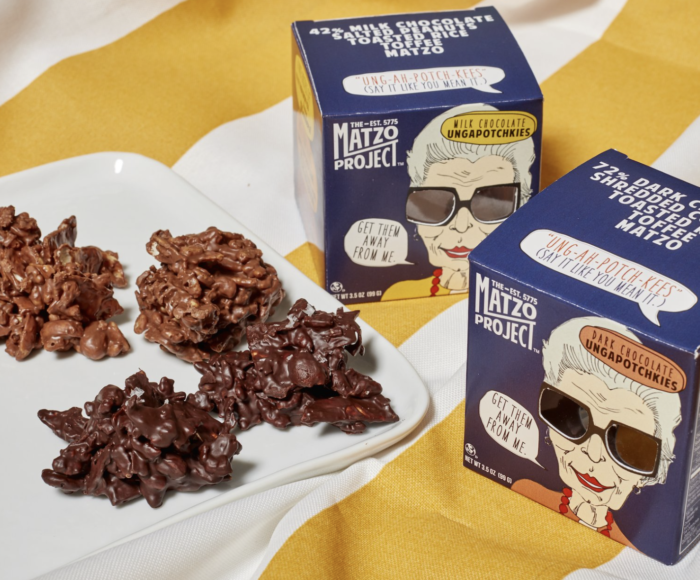No One Ever Compliments Matzo, But This One’s Different
A Brooklyn startup takes the old Passover staple and puts a savory new spin on it, launching a snack sensation
Business partners Rodriguez and Albert met 30 years ago at summer camp (Photos courtesy of the Matzo Project)
Matzo, for all its ceremonial importance, is rarely embraced for its flavor. “Unless that matzah [is] slathered in Fluffernutter, or jammed inside a Chipwich, it tastes like the box it came in,” Jon Stewart once said. The Book of Deuteronomy calls it “the bread of affliction.” This traditional unleavened flatbread, central to the Jewish observance of Passover, just doesn’t inspire cravings at snack time.
That is, unless you happen to pick up a bag of cinnamon-sugared matzo chips from The Matzo Project. Or the variety with everything on it, “plus two other things.” The Brooklyn-based venture set out two years ago to make “surprisingly delicious” matzo, with the goal of moving matzo out of the ethnic-food section of the grocery store and into the snack aisle. The company has succeeded far beyond that, selling its expanding product line in such diverse outlets as Bloomingdale’s, Dylan’s Candy Bar and Eataly, the Italian-food marketplace.
The Matzo Project is the creation of Ashley Albert and Kevin Rodriguez, two Jewish friends who met at summer camp 30 years ago and never expected to become business partners. But the idea for The Matzo Project first surfaced two decades ago. Recalls Albert: “I had a next-door neighbor in the West Village whose family was selling their pizza restaurant and there was this big, old pizza oven. And I kept saying, ‘You should keep that pizza oven and do something with it!'” Albert suggested starting a matzo factory, but the friend “did not take me up on it.”

What began with matzo bread has led to chips, sweets and soup kits
The two friends, meanwhile, went into quite different careers, with Rodriguez earning a master’s degree from Brooklyn’s Pratt Institute and working for designer Vera Wang, while Albert built a busy career as a voice actress and vocalist with The Jimmies, a band that plays children’s music. She’s also co-owner of the Royal Palms Shuffleboard Club in Gowanus.
One day when Rodriguez told Albert he wanted to change careers, mentioning the food business, Albert pulled out the idea she’d been storing for 20 years. “I went, ‘Ah! You know what you should do? You should totally make artisanal matzo.’ He was like, ‘Yes! I love it!’ And then he went home and started working on a recipe.” Rodriguez would bring her samples. “I would taste it like a matzo king and say, ‘Saltier!’ and ‘Less flour!’ until we landed on a recipe.” They believed in matzo’s potential as a more mainstream product. “We just wanted to make it known that it was this underrated cracker,” Albert says.
The other key ingredient is the packaging, which sends a strong signal that this product is an irreverent take on tradition. The face of the product is a cartoony, Jewish-grandmother type who spouts such maternal phrases as “Would it kill you to try something new?” and “Eat something. You look skinny.” Says Albert: “I knew that there had to be such good packaging that people were compelled to buy it. And then they would try it and realize that it was delicious and come back again. But it’s such an unsexy product to begin with that, if the packaging wasn’t something that people would respond to, we would be stuck.”
Albert came up with the basic idea of the grandmother and the matzo in the package showing through her glasses. Then the partners hired several graphic designers, each of whom wound up contributing an element of the finished package.

The founders considered matzo an “underrated cracker” with mainstream potential
One important distinction about the company’s products is that they’re kosher, but not certified kosher for Passover, a much more stringent standard in terms of the preparation. That was an intentional part of the business model: to take matzo out of the religious realm, so it wouldn’t be confined to use only during the holiday. “We absolutely started out with it being a year-round thing,” explains Albert. “We knew that we didn’t want it to be kosher for Passover. To some people who are very religious, that really matters. But to many, it doesn’t.”
Albert and Rodriguez decided to launch their product during Passover season, despite the product’s non-conforming status. “We knew that our best bet would be to launch during passover because that was the first time that anyone was going to give us a shot at trying it.” They placed their new product in four stores and sold out by 11 a.m. the same day.
Since then, the company has expanded its offerings. “We have these matzo chips, which didn’t exist before. We made them up. They are more versatile than a pita chip. More flavorful than a water cracker and more elegant than a saltine,” says Albert. The company’s Matzo Ball Mix, introduced last year, has been adopted by Zingerman’s, the renowned deli in Ann Arbor, Mich., which hadn’t changed their matzo-ball recipe in 35 years.
The Brooklyn company offers a complete Matzo Ball Soup Kit as well. “You know how they say you can’t have a good apartment, a good job, and a good relationship at the same time?” asks Albert. “Well, you can’t have a chicken broth that has no MSG, no Yellow Dye No. 5, is vegetarian, has no artificial anything, and is kosher. You can’t have all of those things at once in a chicken broth. And yet somehow we were able to achieve that. And I am so smugly proud of that because it was so hard to do.”

The company describes its Ungapotchkies as “cockamamie chocolate clusters”
The company sells dessert too, “cockamamie chocolate clusters” made with such ingredients as coconut, toasted rice and toffee (and, of course, matzo), called Ungapotchkies. “The word in Yiddish means too much going on,” explains Albert. “Like if you had a shirt that had beads and studs and rhinestones. My grandma would be like, ‘That shirt is ungapatchka.'”
While The Matzo Project has a lot going on, they’re still taste-testing new recipes in their Sunset Park headquarters. “We do have one new matzo-chip flavor. We just tested it this month and it’s so good. I can’t tell you what it is, but I will say that it’s spicy. That’s your hint,” says Albert. Jalapeno Cheddar? Wasabi? The possibilities are endless. In the meantime, we have the Ungapotchkies to hold us over.










